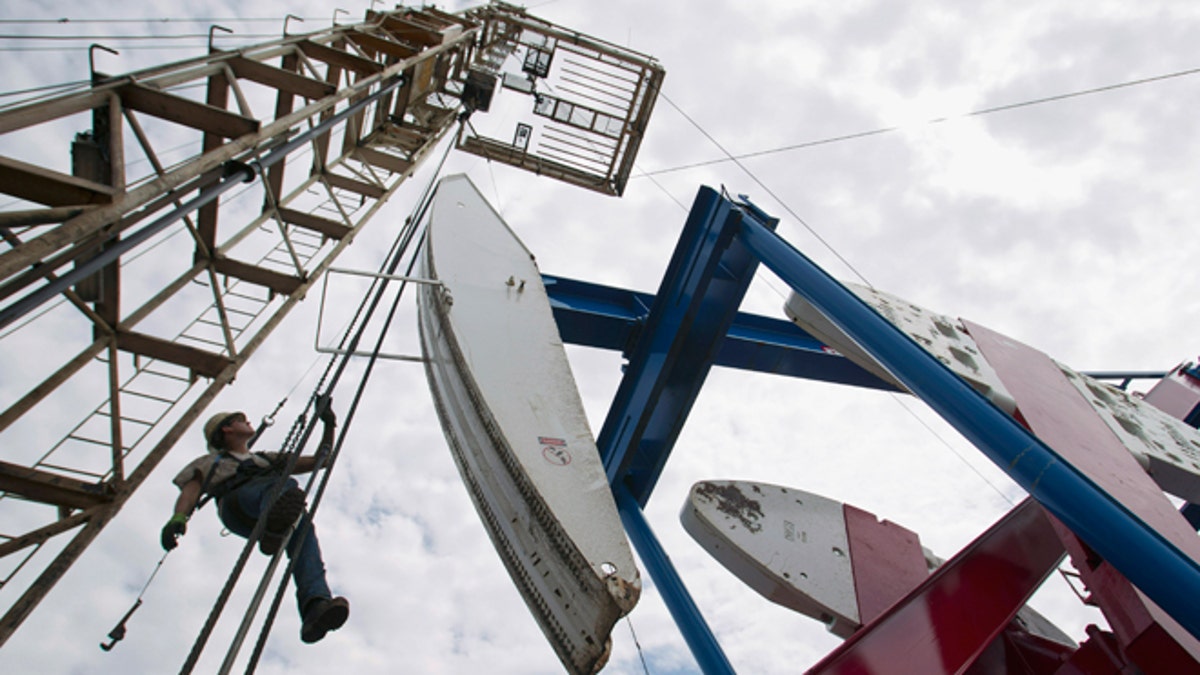
FILE - July 26, 2011: A worker hangs from an oil derrick outside of Williston, N.D. (AP Photo/Gregory Bull, File)
"How does it feel to be the one person disagreeing with over 100,000 people?!" the protester at the People's Climate March asked me.
On that Sunday, September 21, when New York City was swarming with protesters chanting "Hey, hey, ho, ho, these fossil fuels have got to go," I was asking for trouble holding a giant "I Love Fossil Fuels" sign and a book called "The Moral Case for Fossil Fuels."
I told the protester I was there because I thought someone needed to stand up for the right to improve our lives using coal, oil, and natural gas--the only source of energy that can provide, cheap, reliable energy for 7 billion people.
[pullquote]
And I told her I wasn’t alone--that most Americans disagreed with the protesters, whose “fossil fuels have got to go” policies would ruin millions of lives in this country and billions around the world.
As it happens, this past Election Day proved my feeling right. As The Hill reports: "Green groups funneled an unprecedented amount of money into top Senate races that determined control of the upper chamber but fell short."
Put differently: America loves fossil fuels. In the 2014 election, more than any in recent memory, candidates competed with one another to take the strongest position in favor of fossil fuels. It was the best illustration yet that Americans see enormous opportunity in, among other things, shale energy technology (fracking), in energy transport (Keystone), and in taking the noose off the coal industry.
But you wouldn’t know this if you listened to President Obama or the liberal establishment. In fact, they are already out trying to flip the script. They claim that Americans are being shortsighted, that they are supporting unsustainable behavior that will make our planet progressively unlivable.
President Obama, who has already shown the willingness to dictate energy policy via executive order, announced immediately that he would be undeterred in his quest to reduce fossil fuel use by 80% by 2050 and by 30% by 2030.
There’s a simple reason Americans have rejected his positions: they have been proven wrong.
Consider their track record in the last 6 years. In 2008, President Obama campaigned on a platform of ending “the tyranny of oil” and replacing it with promising green companies like now-bankrupt Solyndra—a “true engine of economic growth” that was “leading the way toward a brighter and more prosperous future.” We heard that our greedy consumption was causing a “Peak Oil” disaster. We were told that unless we passed cap and trade, the world would heat up dramatically. None of this happened.
We have run into oil, not out of it, thanks to human ingenuity. As I document in my new book, "The Moral Case for Fossil Fuels," (Portfolio/Penguin November 2014) every indicator of human well-being is improving, from life expectancy to individual income to nourishment to access to clean water to safety from climate.
Far from running from these sources of energy, we should be proud of our fossil fuel use. While fossil fuels have risks and side-effects, like anything else, their benefits are indispensable. It is affordable energy from fossil fuels that runs our farms, that powers our hospitals, that purifies our water, that runs our factories.
Yet it’s often considered out-of-bounds to proudly and publicly support fossil fuels. But if this past election’s results show anything, it shows that Americans are willing to hear the truth about energy use. To Republicans and their supporters, what this means is that the moral high ground is still up for grabs.
To win it, they will need to articulate positive, specific policies. This takes clarity and courage. For instance, on the EPA, they need to challenge the EPA's deadly "clean air" regulations that are based not on the objective evidence about what concentrations of power plant emissions are unhealthy, but the dogma that emissions must always be lower -- even if that means shutting down absolutely necessary and perfectly healthy coal plants.
Politicians love to overuse the phrase “teachable moment,” but this is an actual one of those. It’s a time to teach and a time to lead.
It’s a time to explain to Americans how and why their native instincts served them well this past election cycle. It’s also an opportunity to begin on a new and better path, one in which we do not demonize companies who are creating our energy future.




















